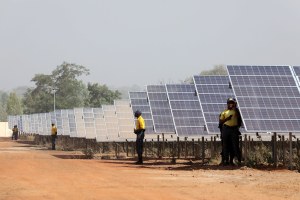The energy transition in African cities marks a key site of geopolitical competition, as China's control of the solar market reshapes urban service delivery.
The current African energy transition is a key site where global politics will be played out. In the current moment, with African cities growing quickly and Africa’s largest cities dominating national and regional economies, this is necessarily an urban question. In this piece, we explore China’s role in Africa’s energy transition.
Since our main interest is in the urban scale, we focus on the ways in which China’s contribution to value chains (particularly manufacturing and logistics) related to solar panels is contributing to the rescaling of urban energy systems and a transition to more distributed and decentralized energy systems and value chains.
We ask: how is China’s control over solar panels and product value chains shaping cities? And how might this process create new sites of geopolitical tension? We situate this conversation in the context of Africa’s fragmented urban fabrics, and the rise of decentralized and distributed technologies in Africa.




